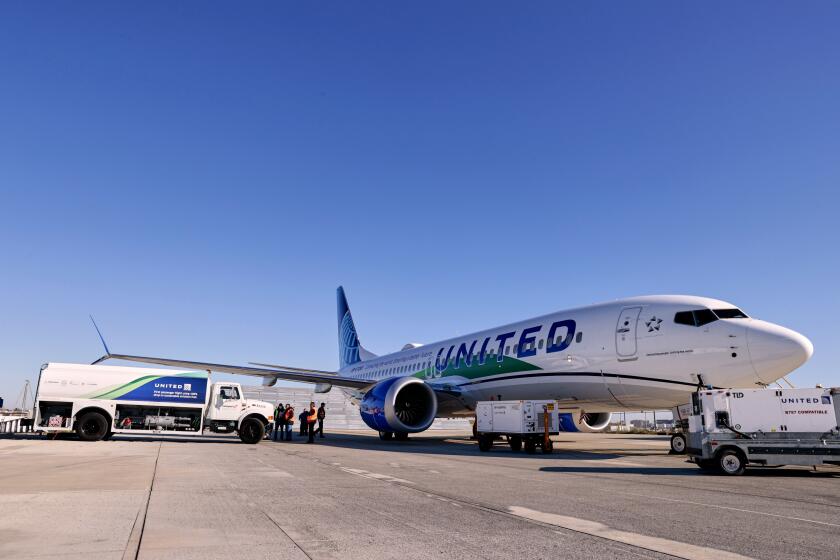Environmental groups move to sue South Bay refinery over mishandling of hazardous waste
WASHINGTON — Several environmental groups moved Wednesday to sue the Phillips 66 refinery in the South Bay, accusing it of years of mismanaging hazardous waste that could pose a health risk to people living near its Wilmington and Carson facilities.
The groups’ planned lawsuit comes four years after the U.S. Environmental Protection Agency first raised concerns about the oil refinery’s practices.
Environmental advocates said their decision to take legal action was the result of frustration with what they said was lax oversight by federal and state regulators.
“These violations are significant,” said Mary Greene, deputy director of the Environmental Integrity Project, one of the organizations that plans to sue. “This screams of sloppy housekeeping and poor environmental management.”
The group, a nonprofit run by a former EPA enforcement chief, as well as Environmental Advocates, a San Francisco-based environmental law firm, and the Huntington Park-based advocacy group Communities for a Better Environment, delivered a notice of intent to sue to Phillips 66 on Wednesday.
The notice is a formal first step toward filing a lawsuit in federal court, but it’s not a guarantee that a suit will materialize — the threat of one can be enough to force a settlement or motivate regulators to take action.
“Phillips 66 is aware of the legal filing,” said a company spokesman, Joe Gannon. “As with all legal matters, we do not comment on specifics related to a particular case.”
“EPA does not comment on ongoing or potential investigations,” said a spokesman for the federal agency.
The California Environmental Protection Agency did not respond to requests for comment.
During visits to the refinery’s two plants in 2015, EPA inspectors found that Phillips 66 was out of compliance with federal hazardous waste management laws. According to the inspections, the refinery had failed to properly store, treat and dispose of hazardous waste.
Most concerning to environmentalists was inspectors’ observation that a stream of liquid selenium waste was leaking from the refinery and into a Los Angeles County Sanitation Districts’ wastewater treatment plant, from which it could make its way to the Pacific Ocean.
Selenium, a pollutant known to be toxic to wildlife, is not something the plant is able to treat or remove, Greene said.
The EPA issued a formal notice of violation to Phillips 66 in January 2017. But since then, the environmental groups say neither the EPA nor California’s environmental regulatory agency has taken action and there have been no repercussions for the refinery.
The refinery’s Carson plant, which processes crude oil, has experienced two fires in just the last year that sent thick smoke into the air, prompting regulators to tell nearby residents to keep their windows closed. Neither fire has been linked to the company’s handling of hazardous waste.
“These hazardous waste violations mean that Phillips has potentially exposed the surrounding community to hazardous waste for years,” said Communities for a Better Environment organizer Ashley Hernandez, who lives in Wilmington. “This is one more example of their un-neighborlike ways.”
Greene said she is concerned that politics may have played a role in the EPA’s inaction. Data on enforcement show that, under President Trump, the agency has become a less aggressive watchdog, adopting a more lenient approach than it had under the previous two administrations. Civil penalties levied against polluters are at their lowest since 1994.
“States often don’t have the budgets to do what EPA can do and they’re often politically hamstrung in a way that EPA shouldn’t be,” Greene said. “When EPA doesn’t enforce anymore, the states don’t either.”
Phillips 66 is a multinational oil and gas firm based in Houston. The company — which also operates refineries in the United Kingdom and Germany and is behind the 76 and Conoco gas station brands — was created in 2012 when ConocoPhillips spun off its refining business.
The company posted $5.6 billion in profit on more than $111 billion in revenue last year — both up sharply from the year before. It is ranked 23rd on the Fortune 500, ahead of Bank of America Corp. and Microsoft Corp.
Times staff writer James B. Cutchin in Los Angeles contributed to this report.







